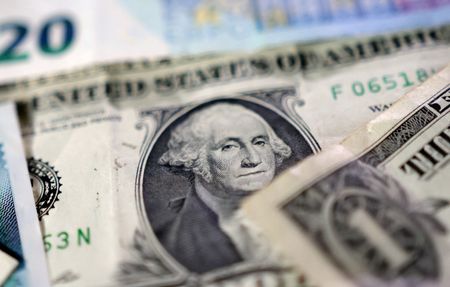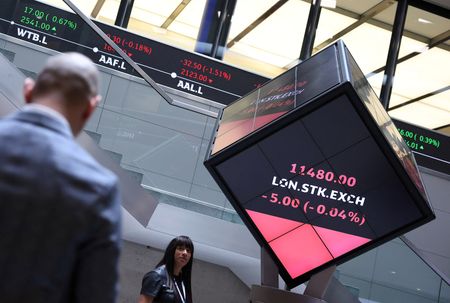By Kevin Buckland and Amanda Cooper
TOKYO/LONDON (Reuters) – The dollar fell on Wednesday, extending a two-day slide against a range of currencies, after U.S. President Donald Trump failed to convince Republican holdouts to back his sweeping tax bill.
Traders were also wary of U.S. officials potentially angling for a weaker dollar at Group of Seven finance minister meetings currently underway in Canada.
Developments in Trump’s global tariff war, which have swung currencies wildly in recent months, have slowed considerably this week, even as the clock ticks down to the end of a 90-day tariff respite for U.S. trade partners in the absence of new trade deals.
While markets remain optimistic that the White House is eager to get trade flowing again on a sustained basis, talks with close allies Tokyo and Seoul appear to have lost momentum.
All this has combined to keep the dollar under pressure and U.S. Treasury yields rising, as the “sell America” theme continues to inform investment decisions, if in a less dramatic fashion than earlier this month.
“We do not consider the USD – and U.S. assets generally – are at the start of a ‘death spiral’,” Commonwealth Bank of Australia analysts wrote in a note.
“However, we forecast the USD to re‑weaken in 2026 once the tariff uncertainty fades and lower interest rates support a recovery in the world economy,” they said. “Additionally, we expect large money managers to allocate less capital to USD assets over time.”
A Moody’s downgrade of the U.S. sovereign debt rating on Friday may have only had a limited impact on markets, but it has added to the narrative of less faith in U.S. assets as safe havens. As a result, the dollar is down on the year against every major currency.
Trump’s tax bill would add $3 trillion to $5 trillion to the country’s debt, according to nonpartisan analysts. Ballooning fiscal debt, trade frictions, and weakened confidence have weighed on U.S. markets.
“Tariff rates are now lower, but not low, and the same can be said about recession risks in the U.S.,” Goldman Sachs analysts wrote in a research note.
“The U.S. still faces the worst growth-inflation mix of the major economies, and as the fiscal bill makes its way through Congress, eroding U.S. exceptionalism is proving – literally – costly at a time of large funding needs.”
An auction of 20-year Treasuries later might offer a litmus test of investor appetite for long-dated U.S. debt.
Japanese Finance Minister Katsunobu Kato said ahead of an expected meeting with U.S. Treasury Secretary Scott Bessent that talks on exchange rates would be based on their shared view that excessive currency volatility is undesirable.
“While market participants do not expect any explicit comment from Bessent on a shift in Washington policy on the dollar, any sign of pushing trading partners in Asia … to conducting less or stopping U.S. dollar buying intervention would likely trigger further big moves weaker for the dollar,” MUFG strategist Derek Halpenny said.
The yen strengthened against the dollar, which fell 0.4% to 143.865, extending gains derived in part from a steep rise this week in domestic bond yields.
The Japanese currency, along with safe-havens like the Swiss franc and gold, got a lift after CNN on Tuesday reported that new intelligence gathered by the United States suggests Israel is making preparations to strike Iranian nuclear facilities.
The pound hit its highest since February 2022 after data showed UK consumer inflation flared hotter in April than most economists expected, thereby clipping some of the Bank of England’s scope to cut rates quickly.
Sterling rose by as much as 0.58% to a session high of $1.347. The euro also held firm, gaining 0.3% to trade at $1.1324.
Federal Reserve officials on Tuesday doubled down on their concerns about the impact of the Trump administration’s trade policies on the economy. The collective message was that the Fed is firmly in wait-and-see mode.
(Reporting by Kevin Buckland; Editing by Shri Navaratnam and Sharon Singleton)








